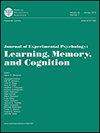宾夕法尼亚编码和检索电生理学研究
IF 2.2
2区 心理学
Q2 PSYCHOLOGY
Journal of Experimental Psychology-Learning Memory and Cognition
Pub Date : 2024-09-01
Epub Date: 2024-07-18
DOI:10.1037/xlm0001319
引用次数: 0
摘要
宾夕法尼亚大学编码和检索电生理学研究(PEERS)旨在描述高度练习者记忆编码和检索的行为和电生理学(EEG)相关性。在五项 PEERS 实验中,300 多名受试者进行了 7,000 多次记忆测试,并记录了脑电图数据。在这里,我们将讲述 PEERS 的故事:它的起源、演变、主要发现,以及它在采用大科学方法研究记忆和人脑方面给我们的启示。(PsycInfo Database Record (c) 2024 APA, 版权所有)。本文章由计算机程序翻译,如有差异,请以英文原文为准。
The Penn Electrophysiology of Encoding and Retrieval Study.
The Penn Electrophysiology of Encoding and Retrieval Study (PEERS) aimed to characterize the behavioral and electrophysiological (EEG) correlates of memory encoding and retrieval in highly practiced individuals. Across five PEERS experiments, 300+ subjects contributed more than 7,000 memory testing sessions with recorded EEG data. Here we tell the story of PEERS: its genesis, evolution, major findings, and the lessons it taught us about taking a big scientific approach in studying memory and the human brain. (PsycInfo Database Record (c) 2024 APA, all rights reserved).
求助全文
通过发布文献求助,成功后即可免费获取论文全文。
去求助
来源期刊
CiteScore
4.30
自引率
3.80%
发文量
163
审稿时长
4-8 weeks
期刊介绍:
The Journal of Experimental Psychology: Learning, Memory, and Cognition publishes studies on perception, control of action, perceptual aspects of language processing, and related cognitive processes.

 求助内容:
求助内容: 应助结果提醒方式:
应助结果提醒方式:


